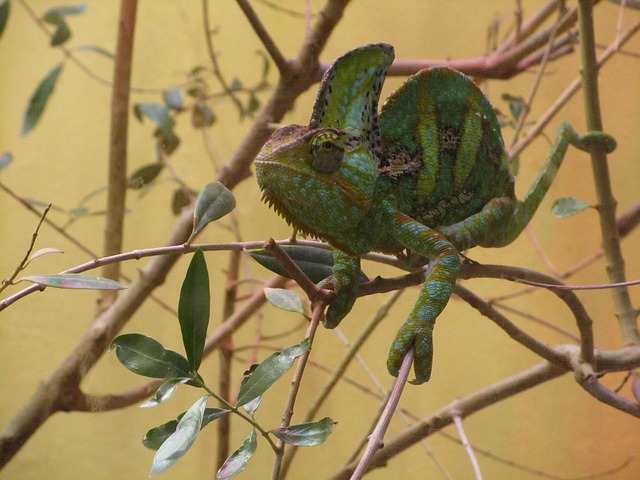The veiled chameleon, or Yemen chameleon, is larger in size. It is a good choice of pet for more experienced reptile owners. Their appearance is unique in that they have tall casques on their head that resemble a helmet. The purpose of this is to hydrate the lizard.
The water that falls on its’ head will be steered into the direction of its’ mouth. Like many chameleons, their bodies can adjust to various shades of colours. These include brown, yellow and green. They are exotic pets and are a pleasure to observe in their environment.
They have a docile disposition towards humans but aren’t keen on being held. That’s because it can be stressful for them.
Many potential new owners will wonder, do veiled chameleons bite and if so does it hurt? So in this article that is what we are going to look at. Plus we will be giving you some safe handling techniques.
You may also want to know if blue tongued skink bites hurt.
Do Veiled Chameleons Bite Humans?
Do veiled chameleons bite? Yes, they do. Although the animal may seem fragile, they have a strong set of serrated teeth. Their dentition is acrodont, which means their teeth aren’t separate from their jawbone. Most of the time, veiled chameleons use their jaws to eat leaves and chop insects. Only rarely do they bite humans.

Do veiled chameleons bite?
Does a Veiled Chameleon Bite Hurt?
Do veiled chameleons bite hurt? It may sting a little bit, but it is more of a minor annoyance than anything else. They do not cause serious wounds. Their bite isn’t strong enough to break the skin. Neither are they toxic or poisonous.
Some chameleons, however, may be carriers of salmonella. For that reason, it is recommended you wash your hands if you get bitten from your pet.
Aside from perhaps being a little startled from the initial shock of being bitten, pet owners have nothing to worry about.
Why Might a Veiled Chameleon Bite You and How Can You Avoid it?
Why do veiled chameleons bite? Why did your veiled chameleon bite you? This is a good question, as there are several plausible explanations for this. One reason for this is because your pet may have felt stuck in a stressful situation or if they are feeling provoked.
They may feel defensive towards you if they think you’re a predator and they’re in danger. However, biting is typically used a last resort. Their first response is usually to avoid conflict. One way your pet does this by running away or trying to leave.
If they are feeling more confrontational, they’ll bluff to minimize whatever threats they feel are directed towards them. Another way your reptile may react is through crypsis, or camouflage.
Contrary to popular belief, chameleons don’t change colours to blend in with their surroundings. Camouflaging happens when the reptile tries to regulate its’ body temperature or when interacting with others. Bold colours on a veiled chameleon are supposed to make it look more intimidating. They’ll usually do so while laying themselves flat and with its’ mouth open.
How can biting be avoided?
Why do veiled chameleons bite? How to avoid it. As a reptile-owner, be mindful of how your pet is feeling. You wouldn’t want to forcefully handle them if they don’t want to be manipulated. If you do, this will stress them, and this may result in them biting you.
Before turning to biting, your veiled chameleon will display warning signs. Knowing how to read your pet’s body language can save you a lot of hassle. First, look at its’ eyes. Chameleons are special in that their eyes move in independent direction from one another.
If they seem to be glaring at you from an angle of 180 degrees, this means they sense danger. It is an instinct that they have developed in the wild that has been passed on to those bred in captivity, as well. The reptile may also hiss to ward off their enemies.
Other behavioural patterns manifested by chameleons when feeling threatened include puffing up and raising their leg.
It isn’t common for veiled chameleons to bite humans. They prefer hiding and fleeing to direct confrontation. To aid your pet in doing this instead of biting, be sure that their enclosure has ample space for it to flee and plants for it to hide in. This will help them to feel safe.
Other factors may also explain why your pet might bite. These may be due to nutrition, illness and even mating.
It is important that your veiled chameleon be fed regularly. Just as humans get upset if they haven’t eaten in a while, so do the reptiles. A lack of food may cause a veiled chameleon to bite. Make sure you provide them with good food in the first place.
Aggressiveness isn’t an issue with juvenile chameleons because they eat once a day. It is crucial to their growth and development. After reaching 8 or 9 months, however, they only require being fed once every two days.
If your veiled chameleon is experiencing pain or discomfort from an ailment, this may also make them more inclined to biting. Not handling them properly can cause chronic stress and this can lead to increased irritability. Injuries on the feet, legs or other parts of your pet’s body may also contribute to its’ bad mood.
To reduce stress, ensure that your pet’s terrarium has a minimum of 12 hours of natural light for its’ daily dose of Vitamin D.
During mating season, a veiled chameleon may also feel confrontational. They aren’t social creatures. They dislike the company of other animals, even when it’s for reproduction. That is because they are territorial. Dealing with fellow chameleons may cause them to vent their frustration onto its’ owner.
What to Do if Your Veiled Chameleon Does Bite You?
What should you do if your pet bites you? Let us first show you ways of handing your pet that will decrease your chances of getting bitten.
When approaching your pet, try these handling techniques. Lift the branch or perch on which your pet is sitting rather than picking up your veiled chameleon. If they seem docile and relaxed around you, give them an opportunity to walk onto your hand.
If it looks like they are trying to bite you, gently restrain them. You can do so by putting your hand around the neck area of your pet’s head. This will limit its’ ability to turn and bite.
What to do if it is too late and you’ve already been bitten? First, check and make sure that your pet hasn’t dislocated their jaw. That’s because the bacteria in the chameleon’s mouth will infect the wound and make them unwell. As for your health, it is best to wash your hands using disinfectant soap and warm water.
In Conclusion
Do veiled chameleons bite?As you’ve read in this article, the veiled chameleon is generally considered a docile creature. However, it is a territorial animal and doesn’t like to be handled. The reptile is known to bite if it is feeling threatened or stressed. Reasons for this include a lack of food, if they aren’t eating enough.
This may also be due to the suffering that comes from an illness or pain on the lizard’s feet, legs or body. During mating season, a veiled chameleon may also show aggressive behaviour because they don’t like being around other animals. And this applies to those of its’ kind, as well.
Their bite does hurt a little, but it isn’t dangerous. To prevent being bitten, limit the time you spend handling your pet. We also suggest you be attentive to its’ warning signs like glaring, hissing, puffing, fleeing and hiding.
